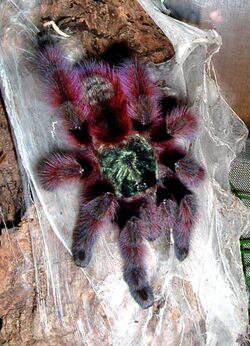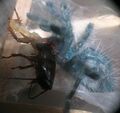Biology:Antilles pinktoe tarantula
| Martinique pinktoe tarantula | |
|---|---|

| |
| Scientific classification Error creating thumbnail: Unable to save thumbnail to destination
| |
| Domain: | Eukaryota |
| Kingdom: | Animalia |
| Phylum: | Arthropoda |
| Subphylum: | Chelicerata |
| Class: | Arachnida |
| Order: | Araneae |
| Infraorder: | Mygalomorphae |
| Family: | Theraphosidae |
| Genus: | Caribena |
| Species: | C. versicolor
|
| Binomial name | |
| Caribena versicolor (Walckenaer, 1837)[2]
| |
| Synonyms[2][3] | |
| |
The Antilles pinktoe tarantula (Caribena versicolor), also known as the Martinique red tree spider or the Martinique pinktoe, is popular as a pet spider because of its docile character and unique coloration.
Previously placed in the genus Avicularia, C. versicolor is native to Martinique in the Caribbean Sea.[3]
Antilles pinktoe tarantulas are arboreal (tree-dwelling). They spin elaborate funnel webs in which they spend most of their time.
Spiderlings of C. versicolor are bright blue with a black tree trunk pattern on the abdomen. As they grow, they gradually lose their blue coloration; the carapace turns green, the abdomen red, and the legs turn green with pink tarsi and a covering of purple hairs. Males usually are slightly more brightly colored than females. As in most tarantula species, males do not grow as large as females, and their abdomens are smaller than those of females, even in proportion to their size.
Taxonomy
Mygale versicolor was first described by Charles Athanase Walckenaer in 1837.[2] In the description, Walckenaer used a female he said was from Guadeloupe and a male from Brazil . However, the two actually belong to different species. This causes nomenclatural problems, since when later workers synonymized Mygale versicolor or transferred it to another genus, they may have ultimately based their decisions on either the female or the male. Caroline Fukushima and Bertani in 2017 treated Mygale versicolor as the female specimen (actually believed to be from Martinique), designating a neotype. On this basis, it is synonymous with Avicularia rutilans. It was transferred to the genus Avicularia by Eugène Simon in 1892 and to the new genus Caribena in 2017.[3]
Distribution
The Antilles pinktoe tarantula is native to parts of the Lesser Antilles islands. It can be found on the island of Martinique.[2]
Gallery
References
- ↑ "Notification to the Parties 2022/073". https://cites.org/sites/default/files/notifications/E-Notif-2022-073.pdf.
- ↑ 2.0 2.1 2.2 2.3 "Taxon details Caribena versicolor (Walckenaer, 1837)", World Spider Catalog (Natural History Museum Bern), http://www.wsc.nmbe.ch/species/37229, retrieved 2017-03-15
- ↑ 3.0 3.1 3.2 Fukushima, C.S.; Bertani, R. (2017), "Taxonomic revision and cladistic analysis of Avicularia Lamarck, 1818 (Araneae, Theraphosidae, Aviculariinae) with description of three new aviculariine genera", ZooKeys (659): 1–185, Suppl. 1–5, doi:10.3897/zookeys.659.10717, PMID 28331414
External links
- Caring for Avicularia versicolor
- Tarantulas of the Genus Avicularia
- Photos of Avicularia versicolor and other 13 Avicularia species in gallery of tarantulas.
- Antilles Pink Toed Tarantula - description
- Avicularia Versicolor | Martinique Pink Toe Tarantula Care
| Wikimedia Commons has media related to Avicularia versicolor. |
Wikidata ☰ {{{from}}} entry
 |




